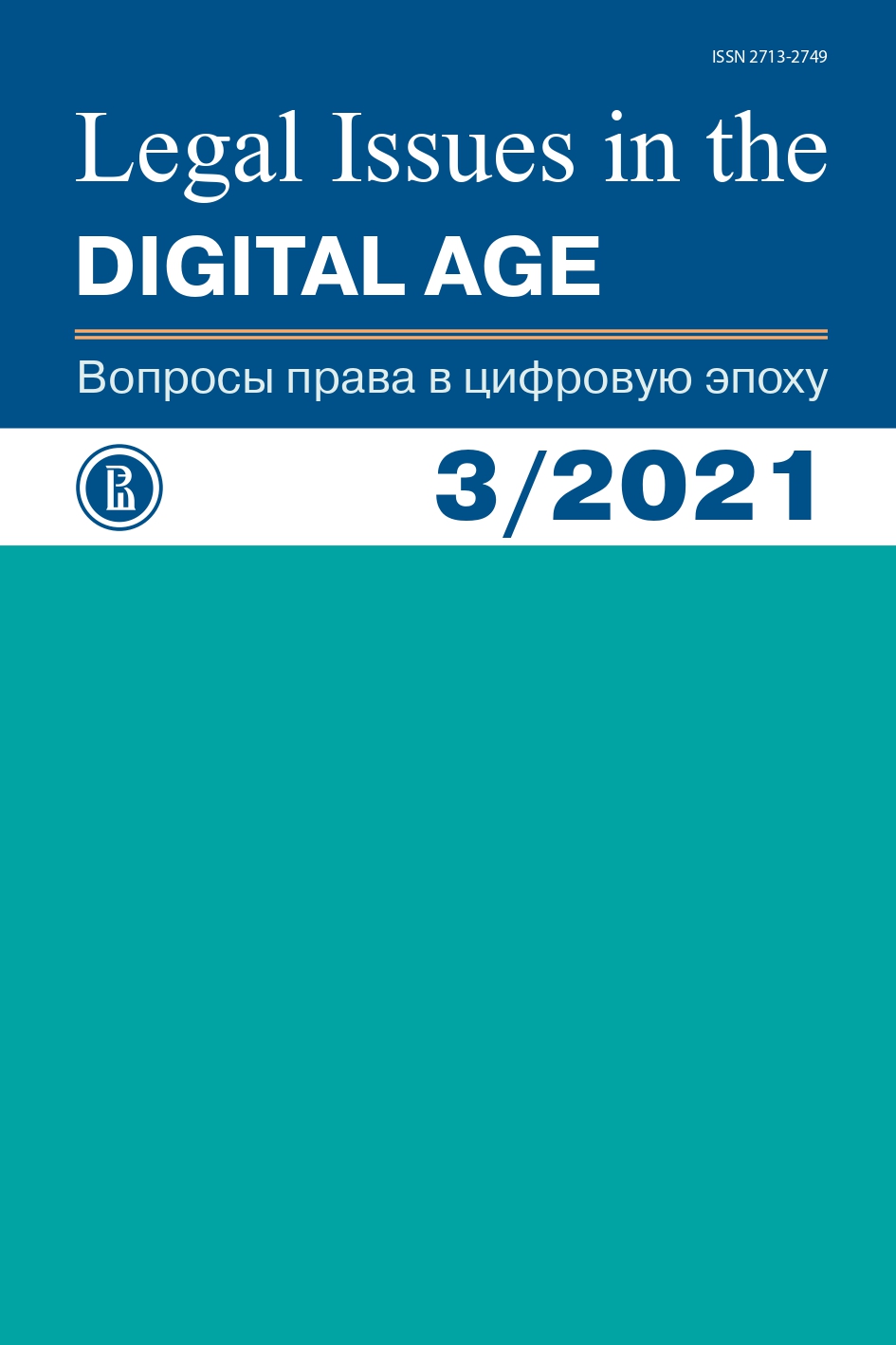The Usage of Musical Works in the Internet within the Russian Law: a Comparative Analysis within the Law of US and EU
Abstract
The article analyzes the “making available” power presented in Russian copyright law, as well as the specifics of obtaining permission to use musical works and phonograms on the Internet. The right to “make available” has been known to Russian law since 2004. This eligibility appears to be very close to the traditional uses of works that existed long before the advent of the Internet. These include, in particular: public performance, broadcasting and cable retransmission. At the same time, “making
available” power is presented in Russian law less fully than the indicated powers. The Civil Code of the Russian Federation describes in sufficient detail the mechanism for obtaining permission by users of musical works and phonograms in the case of their public performance, broadcasting or cable retransmission. In particular, broadcasting organizations, which include radio stations and television companies, as well as users of the public sphere, such as theaters, museums, cinemas, etc.,
are authorized for the respective uses of works and phonograms through collective rights management organizations. Such organizations represent the interests of rightholders when interacting with users and conclude either licensing agreements or agreements on the payment of remuneration with the latter. Among other things, the Civil Code provides for certain cases of endowing collective rights management organizations with accreditation, which allows issuing permission from an unlimited circle of rightholders, including foreign ones, as well as those who have not entered into an agreement on the management of rights with such an organization. At the same time, recently more and more works and phonograms are distributed on the Internet. Online cinemas, TV channels, theaters, museum exhibitions, etc. are
gaining wide popularity. These resources also use musical works and phonograms, similar to using offline. However, it should be noted that there is legal uncertainty in Russian law related to the mechanism for obtaining permission to use works and phonograms on the Internet. The content of the powers presented in the law of Russia for making a work available, its public performance, broadcasting, communicating by cable, as well as the scope of accreditation, do not allow us to unambiguously conclude about the application of the existing mechanism for obtaining permission through the relevant collective management organizations.
References
Benley L., Sherman B. (2004) Intellectual Property Law: Copyright. Saint Petersburg: Juridicheskiy Center Press, 231 p. (In Russ.).
Boucher F.C. (1987) Blanket Music Licensing and Local Television: A Historical Accident in Need of Reform. Washington & Lee University Law Review, no. 44, p. 1157.
Civil Code of the Russian Federation (2018) Copyright. Copyright related rights. Article-by-article commentary to chapters 69–71. B.M. Gongalo, V.O. Kalyatin, M. Ya. Kirillova et al. SPS Consultant Plus. (In Russ.).
The civilian concept of intellectual property in the system of Russian law (2018) Rozhkova M.A. (ed.). SPS Consutant Plus. (In Russ.).
Christie A., Dias E. (2005) The New Right of Communication in Australia. Sydney Law Review, vol. 27, no. 2 , pp. 237–262.
Commentary on the Civil Code of the Russian Federation (2016) Vol. 1. Gorlenko S.A., Kalyatin V.O., Kiriy L.L. et al. SPS Consutant Plus. (In Russ.).
Depreeuw S. (2014) The variable scope of the exclusive economic rights in copyright. Cham: Kluwer Law International, p. 616.
Edwards L. (2010) The Role and Responsibility of Internet Intermediaries in the Field of Copyright and Related Rights. Geneva: WIPO, 73 p.
Eremenko V.I. (2005) Changes in the legislation of the Russian Federation on copyright and related rights. SPS Consultant Plus. (In Russ.).
Fiscor M. (2002) Cоllective management of copyright and related rights. Geneva: WIPO, p. 113.
Frankel S., Gervais D. (2016) The Internet and the Emerging Importance of New Forms of Intellectual Property. Cham: Kluwer Law International, p. 217.
Gavrilov E.P. (2005) Commentary on the Law on Copyright and Related Rights (itemized). SPS Consultant Plus. (In Russ.).
Gavrilov E.P. (2005) Some issues of copyright and related rights. Economika i pravo = Economy and law, no. 1, p.1. (In Russ.).
Ginsburg J., Treppoz E. (2015) International copyright law: U.S. and E.U. perspectives. Cheltenham: Edward Elgar, p. 314.
Intellectual property law: current issues (2014) S.M. Mikhailov, E.A. Morgunova, A.A. Ryabov et al. SPS Consultant Plus. (In Russ.).
Ivanov N.V. (2017) Legal regulation of the use of musical works in TV programs. Zhurnal suda po intellektualnym pravam = Journal of the Intellectual Rights Court, no. 17, pp. 6–13. (In Russ.).
Kalyatin V.O. (2005) Legal issues of using work in the Internet. Informatcionnoepravo = InformationLaw, no. 1, pp. 16–20. (In Russ.).
Koo J. (2019) The Right of Communication to the Public in EU Copyright Law. Oxford: Hart Publishing, pp. 58–81.
Lipzig D. (2002) Copyright and related rights. Moscow: UNESCO Publishing House, p. 161.
MacGuigan F. (2015) Making available, communication to the public & user interactivity: An analysis of the application of communication and performing rights to licensed music streaming services and the subse-quent impact on performers. L.: University of Westminster. P.21.
Peter K. (2010) Digital Copyright Reform and Legal Transplants in Hong Kong. University of Louisville Law Review. vol. 48, pp. 726.
Pogulyaev V.V., Vaipan V.A., Lyubimov A.P. (2006) Commentary on the Law of the Russian Federation “On Copyright and Related Rights” (itemized). SPS Consultant Plus. (In Russ.).
Savola P. (2017) EU Copyright Liability for Internet Linking. JIPITEC, no. 8, pp. 138–150.
Szczepańska B. (2004) Digital is not different — copyright in digital environment. Warszawa: Purdue University, 10 p.
Sytenko G.I., Vilinov A.A. (2010) Topical issues of regulation of relations for the protection of copyright and related rights on the Internet. Kultura: upravlenie, ekonomika, pravo = Culture: management, economics, law, no. 2, pp. 7–11. (In Russ.).
Wunsch-Vincent S. (2013) The Economics of Copyright and the Internet: Moving to an Empirical Assessment Relevant in the Digital Age. Geneva: WIPO, 18 p.
Authors who publish with this journal agree to the Licensing, Copyright, Open Access and Repository Policy.










